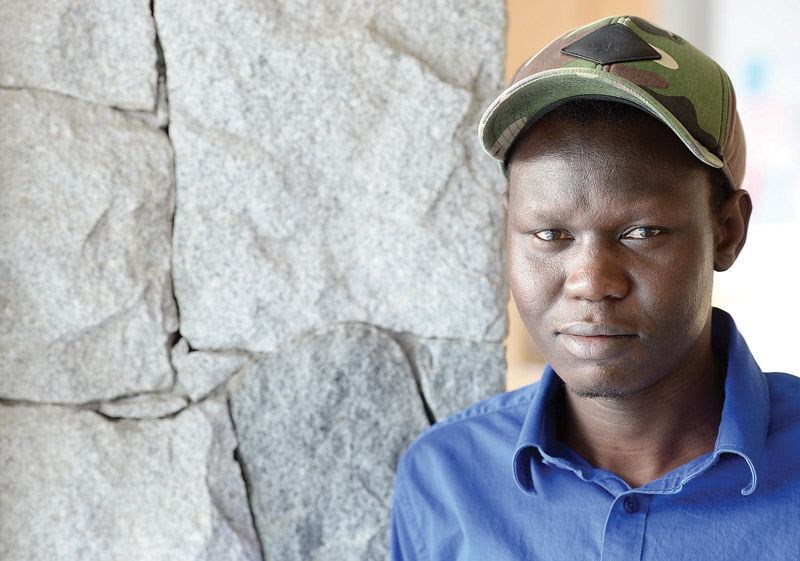Whether it was Deng Manyang as a boy in the midst of the second Sudanese Civil War or Deng Manyang as a highschool student winning scholarships in a Kenyan refugee camp or Deng Manyang as the Canadian permanent resident doing his degree in Prince George, the goal has always been the same: excelling in education.
"You can excel even if the conditions are not that favourable," said Manyang, who won a scholarship in 2011 to the University of Northern B.C. through World University Service of Canada's (WUSC) student refugee program.
The conditions were not favourable.
Deng, now 26, spent his boyhood moving by foot within South Sudan's borders, far away from his home in the southern region of Boa, always in pursuit of safer territory when fighting threatened his current camp.
"It was not a peaceful moment," said Manyang, who traveled with whatever he could carry - often a blanket and sleeping mat.
People got used to the constant upheaval, he said, but not the trauma.
"It's not a fun thing because when you move, you leave people behind."
Both Manyang's mother and father died during the war.
"You will be lucky to get out of that area alive and then you're gone, set up a camp again, stay there for awhile. If anything happens again, then if you are lucky, move on," said Manyang, a fourth-year math and economics joint major.
"I rarely talk about my past, especially during the war time," he said. "It revives some unwanted memories."
As a teenager, after more than 10 years moving within his country's war torn borders as what is known as internally displaced person, he left with relatives to the Kakuma refugee camp, in Kenya. One of the world's largest refugee camps, Kakuma was home to more than 150,000 refugees in April 2014, according to the UN Refugee Agency.
It's also one of the refugee camps where WUSC works to bring promising students to Canada, granting them scholarships and permanent resident status. Since 1978, the organization has sponsored more than 1,300 students.
Five, including Manyang, came through UNBC's chapter, which is working on welcoming a sixth student next semester. Students become permanent residents and access domestic tuition rather than the much higher international rates.
Manyang said relatives say he is lucky, but it wasn't luck that made him study by lamplight in Kakuma's dark tent city, or luck that won him a scholarship to study in Kenya's public school system, or luck that got him the grades to be considered by WUSC.
"It's just a determination to succeed," said Manyang, even as he acknowledged the hundreds of others in Kenya who also applied.
"To get that chance to go to university is a privilege," said Manyang, who has a full course load while working a part-time job and logging several hours as a tutor. "There are many people who want to achieve many things in life but if they don't have the opportunity, they won't achieve."
Joshua Mann, the co-chair of Prince George's WUSC committee, has worked to increase the number coming through its student refugee program.
It used to be every two years, but now UNBC sees one student every year.
"Our university is one of the smallest universities that does this with WUSC and relatively speaking... we sponsor some of the most students," Mann said.
In two years, the group has grown to 20 active members (and 100 on its list) and improved its fundraising: it needs roughly $40,000 per student to cover the first year of tuition, then provides funding in the subsequent years on a sliding scale.
This week, Mann and eight others are headed to Montreal for the national organization's Annual International Forum, which will focus on international development and help train committee members to welcome students like Manyang.
"I try to understand where they're coming from," said Mann, who will be presenting at the forum. "I think that's the most important thing: listening to what peoples' needs are."
Mann also stressed it's important not to define students by their past status as refugees.
"That's not what they are anymore. They're a permanent resident in Canada, they're a sponsor student. They're just another human being."
Manyang said it helped having a supportive group of people to ease his transition in a new city.
He has become that welcoming face for new students as someone who understands and can perhaps communicate how to live in a present so very different from one's past.
"There are times for everything," Manyang said. "There is time that should you be in pain, but you have hope... that some time you may be in peace."



